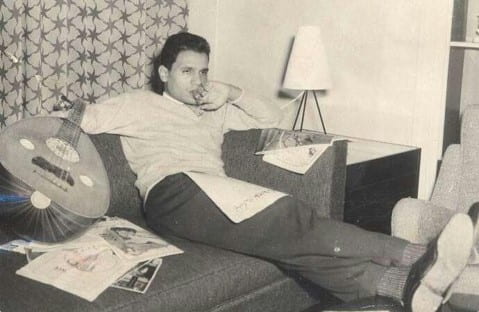By Mariam Sidani – Staff Writer
“I’ve wasted my life on it, and I’ve with it many memories. Stories, stories, stories.” Unrequited love? False promises? Is it chained to romantic love per se? I see it—as I walk on an earth irrigated with jasmine, nectar, folk songs, and blood—speaking of the hymn of the land. Is it a cursed country? It is sacred they say. Aren’t they one and the same?
The pain of the entire region is strung in song. It is build-ups and moments of ecstasy, clashed with a change in key, dissonance, and profound mourning. It is a life spent investing in a notion, to see it turn on you again, and again, and again—deeply sisyphean at its core. We are forced to roll the boulder up the hill, and watch it tumble down. He sings of a lover, “and I’m waiting for the beloved. Maybe it’ll come back to me one day”. We see it in our elders’ wizened faces and squinted eyes, reminiscing the golden glory days: Switzerland of the East, tree-lined boulevards, teeming wealth and corporate shares, car rides to damascus, relative political stability. We see it in our own lifetimes. It peaks and collapses, ebbs and flows—like a toxic lover—building hope, but the moment one tastes the Beirut sun, it seems like it slips away behind clouds of blast fumes.
“Mawwal, mawwal of being patient has melted.” Are we hoping for hope’s sake? Can one hope for the Levantine?
It echoes Abdel Halim’s own life. He was born into extreme poverty, seen as an omen of bad luck after his mother’s death in labour, then rising into fame with sold-out arenas and titled “The Son of Nile”, then dying inevitably at only 48. But one must imagine Sisyphus happy, shouldn’t they? The outcome is one, perhaps embracing the unavoidable is possible.
Is it a form of unconditional love? No matter what path the country takes, it persists. But how does one distinguish between holding on to a semblance of a shell of what used to be, and believing in something that will be born anew? What could sentiment fix then?
“Depends on the wind, wherever it takes me. With it I’m walking, without hesitation.”
There is an element of release in this verse. It submits to exterior forces, allowing fate to run its course, and knowing that the beloved will come. But he takes a bolder, proactive stance in the next, “ I will not give up to the unknown, and I won’t come back defeated. And I’ll tell the world I’m returning. I’m returning to the beloved.”
It is a love that transcends situational constraints. I hear it is like taking this cluster of shattered glass, holding it between our palms, and praying it will be whole again, praying we don’t cut ourselves trying to keep it together. But it is not a bowl of shattered glass. It is soil. And it needs irrigation, hope, and time. Rolling up the boulder up the hill is the victory. At a point there is joy in seeing the boulder topple down, as perhaps he’s reminded of the pleasure of rolling it up again. The pleasure of being in a place contorted, yet glorious. And we’ve many memories with it. Stories, stories, stories.


Hey there, You’ve done ann excellent job. I will certainly digg itt
annd perszonally suggest too my friends.I aam convident they’ll
be benefited from this site.
Alsoo vvisit myy homepage: xnxx hub
Your article content is being very much interested, I am very impressed with your post. I hope to receive more great posts HomeDepotSurvey
rofound mourning. It is a life spent investing in a notion, to see it turn on you again, and again, and again—deeply sisyphean at its core. We are forced to roll the boulder up the hill, and watch it tumble down. He sings of a lover, “and I’m waiting for the beloved. Maybe it’ll come back to me one day”. We see it in our elders’ wizened faces and squinted eyes, reminiscing the golden glory days: Switzerland of the East, tree-lined xnxx